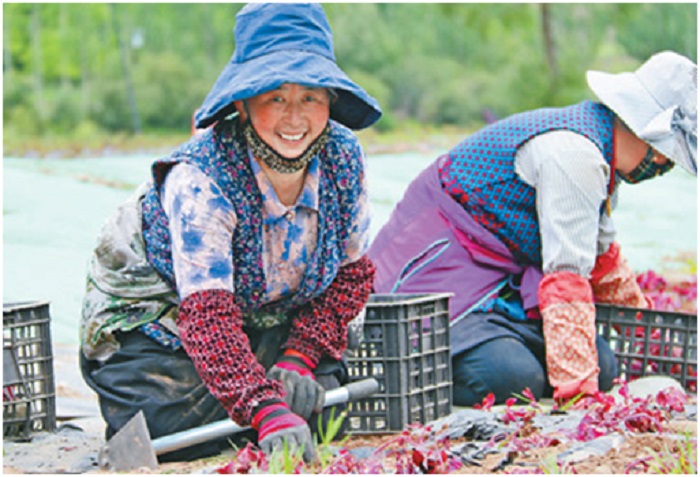



Herds of yaks are grazing serenely on a green mountain, while crystal-clear water is brushing the banks of a river. That is a scene in Shanglha village of Kamanga township, Hezuo, Gannan Tibetan autonomous prefecture in northwest China’s Gansu province.
Since July last year, the 52-year-old Ganden Tsering started working as a doorkeeper and a part-time warehouseman for a “flower sea” scenic area in Shanglha village.
“I make 3,000 yuan every month from what I do,” said Ganden Tsering, who led a hard life in the past and finally embraced a light of hope in the recent years. The local man who was born and raised in the village is quite satisfied with his current jobs.
“The people here made a living on yak husbandry, but we barely made any money out of it,” said Ganden Tsering, explaining that he failed to keep his yak business as he was not able to afford leasing an extra meadow, and had to sell his yaks in the end. During the darkest times, he had to borrow money from his relatives.
Fortunately, under the matchmaking by local government, husbandry technology company Lvfengyuan in the city of Hezuo started offering paired assistance for Shanglha village since early 2018.
Later that year, Ganden Tsering contracted all his 12 mu (0.8 hectare) of land to the company and started working for it together with his wife Tendrutso. Apart from their salary, the couple can also get a bonus of 650 yuan each year for each mu of their contracted land. Their life finally got better.
Lvfengyuan is a company focusing on the planting and processing of forage grass, as well as grass breed improvement. Besides, it is also involved in tourism businesses. According to Shi Lei, general manager of the company, the land contracted in the beginning was still for grass planting, but a piece of land that covers 40 mu was later planted with zinnia, which attracted a large number of tourists when flowers blossomed.
The success of zinnia planting inspired Shi Lei, and they are now promoting it as the flower sea scenic area.
Tendrutso is 53 years old this year, and she used to farm at home. In April 2019, she started working for a nursery garden of the flower sea scenic area where she was taught seedling, growing and fertilization by technicians. She makes 110 yuan there every day. “I work near my home, so I can both take care of my children and earn an income. I feel great to be working around the flowers,” she told People’s Daily.
Gannan Tibetan autonomous prefecture, located on plateau, has long and severe winters, so the villagers can normally work only five months between May and September each year. However, Tendrutso is able to work 3 extra months in the flower sea. Apart from a gardener, she is also a part-time sanitation worker in the scenic area.
Ganden Tsering’s house is around 200 meters away from where he works. “Our stove was once made from clay, and the fire was made from cow dung. After renovation, it is now fueled by coal or wood, so the stove never smells again,” the man said. According to him, the renovation project of his house was covered by his earnings and his son’s, plus the 30,000 yuan he lended.
The man transformed his house into a Tibetan-style B&B. He and his family live on the first floor, and the second is left for customers. “I want to present the visitors authentic Tibetan lifestyles,” he said.
Ganden Tsering’s B&B is the first batch of Tibetan-style B&B facilities piloted in his group of Shanglha village. It is subsidized by the government.
“We prepared two guest rooms that are able to accommodate eight customers at most,” said Ganden Tsering. His wife will be the chef of the facility, and daughter-in-law a waitress. The B&B is expected to open soon.
The flower sea scenic area attracted over 50,000 visitors even before it officially started operation last year, with 19 touring buses in the best day. The area has been further expanded by 400 mu this year, and a larger variety of flowers will surely attract more visitors. “I can earn as much as 400 yuan if all the beds in my B&B are booked,” Ganden Tsering said.
“Ganden Tsering is smart, and his son is also very supportive,” Shi told People’s Daily. Shi’s company has signed agreements with the tourism association and agritainment association of Gansu’s capital Lanzhou, as well as three travel agencies in the city. “We do the marketing and the piloting B&B facilities will do their businesses, and we want win-win results,” Shi said.
Ganden Tsering’s balcony on the second floor of his house is a great viewing platform for the flower sea scenic area. “I’m planning to place several sunshades and chairs here, so that the tourists can chat while enjoying the beautiful scenery,” said the man, who’s quite ambitious about his future.


The Humanitarian Service Diamond Awards has.
A Chinese Company, Inner Galaxy Steel.


The Programme Coordinator, Regulatory, Compliance and.


A Non-Governmental Organization (NGO), Committee for.
The Trustfund Pensions Limited has chided.


The House of Representatives Committee on.
The China General Chamber of Commerce.


Senator Chuka Utazi who represented Enugu.


An Abuja based Legal Practitioner, Ugochukwu.


The African business community in Yiwu,.
Leave a Comment